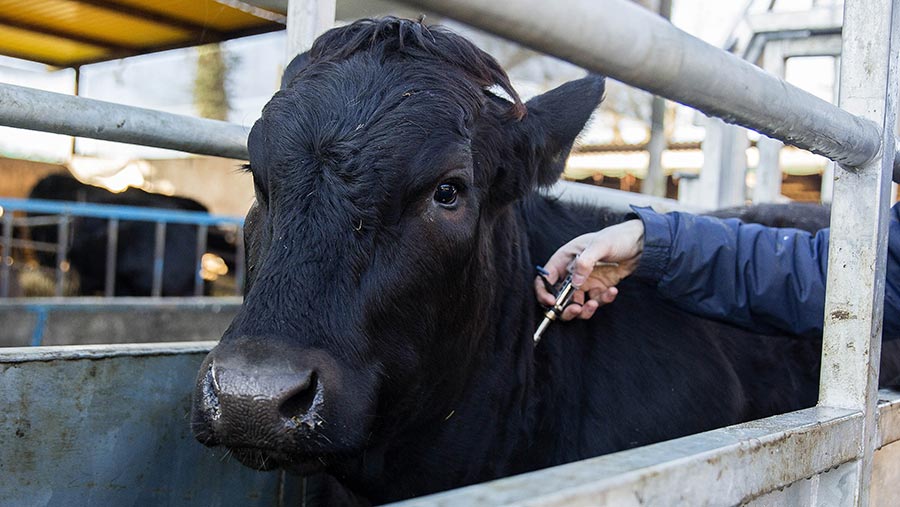Harper Adams and Keele in talks over vet school
 A cow being tested for TB © David Hartley/REX/Shutterstock
A cow being tested for TB © David Hartley/REX/Shutterstock Proposals to establish a new veterinary school have been announced amid fears over the possible exodus of foreign animal health care experts, post Brexit.
The new school would be a joint venture between Keele University and Harper Adams University with teaching facilities at both sites.
Although the two universities said the proposals were at an early stage, a joint press statement set out the aim to provide five-year degrees.
It is hoped that the Bachelor of Veterinary Sciences (BVSc) degree would be accredited by the Royal College of Veterinary Surgeons, enabling graduates to register as vets as soon as the qualification was awarded.
See also: Vet Viewpoint: Ticks, pneumonia and the value of FECs
The universities said the vet school would try to increase the number of UK vet students by encouraging and recruiting people who may not have previously considered the profession.
Employability boost
Jonathan Wastling, pro vice-chancellor at Keele University said: “Our intention is to produce highly employable graduates able to deal with the challenging and rapidly changing landscape of the modern veterinary profession.”
Professor Wastling added: “The school will draw upon expertise in life sciences and our highly regarded medical school, as well as Harper Adams’ long-established record in delivering programmes in the vet field, agriculture and animal sciences.
“State-of-the-art laboratories available on the Keele campus will be complemented by world-class large and small animal facilities provided by Harper Adams, offering the perfect environment for students.”
Harper Adams University deputy vice-chancellor Peter Mills said the initiative would complement existing subjects in agriculture that covered the care and treatment of livestock.
“The proposal will be of considerable benefit to our agri-food provision. It will enable our agricultural students and trainee veterinarians to have greater awareness of the issues facing both professions,” said Professor Mills.
“It will also open up new avenues for livestock research, advanced veterinary training and knowledge exchange, ultimately to the benefit of the farming sector,” he said.
Further discussions and detailed business planning will be undertaken over the coming months, with a view to a further announcement later in the year outlining when the new school would expect to receive its first cohort of students.
Guarded response
The British Veterinary Association (BVA) gave a cautious welcome to the proposals for what would be the UK’s ninth vet school.
BVA president Gudrun Ravetz said: “This is a very interesting development at a time when there are many questions around the sustainability of the UK veterinary workforce as the UK prepares to leave the EU. It also comes at a time when many practices are reporting significant problems in recruiting.”
“Striking the right balance between producing home-grown graduates from UK veterinary schools and bringing in appropriately qualified and skilled foreign graduates will be key to maintaining a flexible, skilled and sustainable workforce.”
But Mr Ravetz said there are important factors that would need to be considered including whether there is enough capacity to deliver quality work placements – a requirement of veterinary studies.
He also questioned how the move might affect the availability of expert teaching staff, particularly given that 25% of current veterinary academics were from non-UK EU countries.
“An increase in UK vet school places also needs to be considered in the context of the Vet Futures project and the Vet Futures actions currently under way, including the RCVS-led Graduate Outcomes project and the BVA-led workforce study.
“We must ensure that we can provide fulfilling career opportunities for our graduates in a wide range of veterinary roles – both clinical and non-clinical – as well as meeting the needs of society now and in the future,” he said.
